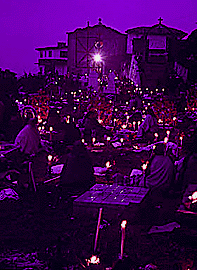
The Path of Marigolds
by Isabelle Carruthers
Solana stands patiently in the bright morning, enjoying the shade provided by the statue of Morelos. The hulking sillhouette spreads comfort over her melancholy, like the nets that the fishermen cast upon the water. She often imagines that the statue's shade follows her around the island during her long strolls under the sun and moon. Morelos, unlike life, is steadfast and predictable.
The first of many women in line, she waits for the market to open. Like them, she has come to buy flowers for the festival, and her fingers wrap tightly around the notes in her pocket. She has precious little to spend, but has saved money for weeks to buy the golden blooms of zempasuchil.
The other women do not speak to Solana, and she does not look at them. She has grown accustomed to her infamy, to the busy tongues that trade stories of her misfortune across fences and in the vegetable stalls of the marketplace. Some of the women pity her in secret and share condolences in the moments when no one is watching. But many more hate her openly and take pleasure in the rumors spread about her. The worst of her detractors is Concepcion. Her vengeful cousin misses no opportunity to fuel the gossip, making certain that hearts will not soften toward Solana with the passage of time.
The church bells announce the new hour, and the market door swings open on cue. A surging tide of women rush forward, pressing Solana hard against the rough edges of the wooden counter. Breathlessly, she pushes her money into the outstretched hand of the merchant.
"Six baskets of zempasuchil?"
"I cannot sell you six baskets," the vendor protests. "Four, that is the limit. Take it or leave it." He turns from her and begins to wait on other customers.
"Four then. Give me four," she agrees. The merchant lugs four large baskets onto the counter and takes her money, counting it carefully. Solana struggles past the throng of women toward the exit.
Concepcion waits near the end of the line, and sneers as Solana approaches the door. "Your pathetic offerings will not bring Agustin back. You would do better to make a shrine to Tlazolteotl. She alone answers the pleas of witches and whores." Voices fall silent around the two women as others await Solana's reaction to this insult.
"Then it is odd that she did not grant yours," Solana replies thoughtfully with an expression of concern. "Then again, maybe not so odd. It is said that she hears only the prayers of a woman, and not the squealings of a horny sow." Stumbling into the street with her burden of flowers, Solana ignores the eruption of raucous laughter and the stream of epithets that Concepcion hurls at her back.
To the amusement of many who stroll through the busy marketplace, Solana soon drops one of her baskets, spilling marigolds into the stone path. When a boy steps forward to offer assistance, his mother pinches his arm and pulls him away, hissing a reprimand into his ear. The boy follows his mother as she hurries down the street, but looks back at Solana with a curious expression. He answers her soft smile with his own, as if he had already decided that perhaps the young woman isn't as evil as his mother claims.
Solana retrieves her cargo and wrestles the baskets before finally gaining a balance, with one on each arm and the other two resting on her shoulders. She makes her way slowly through the narrow paths to her house near the water. The neighborhood is more deserted than usual, with the men long since gone to their boats and the women busy inside, preparing food for Dia de los Muertos, the annual festival to honor the dead.
Small groups of children play in front of the houses and pause in their games as Solana nears. Some dart into alleys at the sight of her, but the younger ones stand silently watching, unaware of any threat from the slender dark-haired woman.
Upon reaching her house, Solana places the burden of flowers on the front stoop and sits down to rest for a moment, stretching her legs and arms lazily into the sunlight. Soon she will have to go inside and tend to the cooking that remains. Sweat trickles from beneath the heavy mass of black hair, and she lifts it away from her neck to catch a cooling breeze from Lagoda Patzuaro.
In the distance, the boats are beginning to return with the early morning catch. The scene reminds her of better days, of a time when one of those boats would have carried Agustin back to her. Even now she enjoys watching when the boats return to harbor, although her throat tightens and it becomes harder to breathe. For many months, she has waited for the healing that she thought time would bring, but her grief has not subsided. She longs for oblivion.
It is autumn now, long past the day in early spring when he did not return to her. She remembers it with vivid clarity, how she had waited and watched as dusk approached. One by one, the other boats came to the harbor, but there was no sign of Agustin. His mate was found a day later on Isla Tecuen, relating a story of the boat having faltered and capsized. Miguel claimed that he had not seen Agustin afterwards, and did not know of his fate. Despite the dire predictions of the other fishermen, Solana was sure that Agustin would soon be found alive and well.
"Agustin is stronger and smarter than Miguel," she said. "He could swim to shore just as easily." She held steady to this belief for days, even when many told her that all hope was surely lost.
But then there were stories that began to circulate of an argument on the dock between Miguel and Agustin on the morning before they set out, of heated words and dirty insinuations.
Some said that Miguel had murdered Agustin that day on the boat, in a fit of jealous rage over a woman.
Some said that the woman was Solana.
And that was the beginning of her fall from grace.
 Solana was five when Agustin came to Isla de Janitzio in the waning days of summer, the son of her fatherís new wife. Gitana was a green-eyed beauty with an infectious good humor, and Solana quickly understood how her widowed father had fallen so deeply in love. After Gitanaís arrival, the small house was always filled with songs and laughter. With Agustin only two years her senior, Solana and her new brother became fast friends. In the afternoons when they had finished their schooling and chores, Agustin and Solana would run off together to explore the island paradise. On rainy days, Agustin would read to her from his books, wondrous tales of dragons and queens to amuse her. At night, they would walk to the summit and sit together in the moonshadow of Morelos, and there she would teach him about the constellations as her father had taught her.
Solana was five when Agustin came to Isla de Janitzio in the waning days of summer, the son of her fatherís new wife. Gitana was a green-eyed beauty with an infectious good humor, and Solana quickly understood how her widowed father had fallen so deeply in love. After Gitanaís arrival, the small house was always filled with songs and laughter. With Agustin only two years her senior, Solana and her new brother became fast friends. In the afternoons when they had finished their schooling and chores, Agustin and Solana would run off together to explore the island paradise. On rainy days, Agustin would read to her from his books, wondrous tales of dragons and queens to amuse her. At night, they would walk to the summit and sit together in the moonshadow of Morelos, and there she would teach him about the constellations as her father had taught her.
"That one, see it? Thatís Orionís belt," she murmured, pointing out the pattern of stars.
"Which one?" Agustin squinted at the sky. "They all look the same to me."
"That one, there." She grabbed his chin and forcibly turned his face toward the constellation that eluded him.
"Oh. It does not look much like a belt."
"Well, you have to use your imagination to see it. "
"It doesnít look anything like my belt," he insisted.
"Maybe not. But Orion has a belt like that. Papa said so."
"Who is Orion?"
"Um... well, I do not know," she admitted.
"Then how do you know he even wears pants?"
Ten summers came and went, and then her life was transformed again. Complaining of an ache in his head, her father went to bed early, leaving the family to have dinner without him. Solana awoke to wrenching cries that sliced the soft darkness like a machete. "Carlos will not wake up!" Gitana screamed. And he never did.
The songs and laughter had ended, and their lives were shrouded in a lingering melancholy. Agustin did his best to manage the boat alone and Solana found a job making tortillas at the islandís only restaurant, but Gitanaís despair deepened, smothering any hope that they could ever regain what was lost. One day Solana returned home from the restaurant to find the house deserted, Gitana and Agustin gone away to live with family in Guadalajara. Solana had only the books Agustin left behind.
She sold her fatherís boat and made tortillas from dawn until dusk, settling into a dismal routine of survival. With the money she earned and the aid of neighbors, she managed to avoid starving. The years crept past with inexorable slowness, and she adjusted to the loneliness, often preferring solitude to the company of others. At night she would still trek to the summit to watch the stars, and sometimes wondered if Agustin could see the constellations so perfectly in the place where he lived.
She did not expect to see him again. And yet, when the sillhouette of a man unfolded under the shadow of Morelos on a warm summer night, she did not recoil but stepped closer, curious. There was something about the way he stood, his head lifted toward the sky, that seemed familiar to her. Before he spoke, before she could see that his eyes were the same shade of green that she remembered, she knew that it was Agustin.
It seemed only natural that he would return to the house of his youth. With money he had saved, he purchased his own boat and settled into the life of a fisherman. At dusk they dined by candlelight, and then walked together to the summit of Morelos, just as they had when they were children. But they were children no longer. They looked less at the stars and more often at each other, until the night when the gaze became a touch, and the touch became a kiss.
"I have loved you since the first night we sat on this hill and looked at stars."
"I know," she whispered.
"How did you know?"
"Because I fell in love with you on the very same night."
"I wish you had told me."
"Yes. But I am telling you now."
"Tell me again." They sank together into the tall grass, and she sighed as his hands covered her.
Guarding their love as one keeps a pearl hidden from the common thief, they were careful to appear as brother and sister to those who might be watching. But when they doused the candles at night, it was a sweeter oblivion they found in each otherís arms. Solana longed to go away to a place where they would be strangers, where no one would look at their love and call it sin. They began to save their money, hoping to move south to a village where they could marry and begin a new life together. For months they lived as lovers behind the bolted door of the house they shared, separated only by the vows that they could not speak in public. Afraid that even the merest touch would give their secret away, they rarely ventured in public together and no longer walked to the summit at night. But despite the care they took, Agustin made a fatal blunder.
In a celebratory mood after an especially good day of fishing, Agustin invited his mate, Miguel, to join them for dinner. Miguel was a frequent guest in their home, and he flirted openly with Solana, believing that she was only Agustinís maiden stepsister and well worth the effort. Agustin seemed amused by his mateís persistent courtship and did not discourage him. Solana scolded Agustin for his lack of good sense, reminding him that there was much to risk.
"I do not like the way that Miguel ogles me," she complained. "And you watch and laugh, when you should tell him to stop."
"Even when you roll your eyes and smack his hand away, Miguel is so arrogant that he thinks you are just being coy. He believes you are secretly in love with him." Agustin laughed, shrugging away her objections. "He brags too much about his stamina and the size of his tackle. It will do him good to see that all women are not easy whores like Concepcion."
"Yes, but he could become angry if I donít act the way he wants. Maybe he will think I am teasing him, playing a game. What then? He might start talking -- he might say something about us..."
"There is nothing to talk about," he assured her. "Miguel will never find out about us."
"But we should be careful," Solana cautioned. "I think he is bad luck."
"Then I will be careful not to touch your breast in front of him, like this." Agustin traced a finger over her nipple. Solana smiled and playfully smacked his hand away.
"No, that is not what I mean."
"And I will be careful not to touch your ass in front of him, like this." He smiled and slid his other hand around her hip, pulling her close.
"Agustin, please, be serious."
"Si, mi amor. I will be careful."
Like many nights before, Solana cooked for Agustin and Miguel, and then retired to her mending behind the bedroom curtain, pretending disinterest in their discussions of boats and women and bigger fish to catch. But tonight, unlike the other nights, Miguel brought some tequila with him. The two men drank it down and became thirsty for more. Agustin produced a bottle of his own, and as the evening progressed they grew more and more drunk. Solana was fast asleep by the time Agustin fell into bed, stripped down to bare flesh as was his custom. She sleepily pulled off her own clothing and snuggled against his warmth. It did not occur to her that Miguel might still be in the house, or that Agustin was too far gone to notice.
Miguelís face was the sight that greeted her upon waking at dawn. He stood gaping at the bedside, where the curtain had been accidentally left open. In his sleep, Agustin had kicked the covers askew, and his state of undress was abundantly clear.
"I know what you must be thinking," she offered lamely, pulling the sheet over her exposed breasts. She was unsure exactly where to begin. Miguel did not speak, but ambled from the house with a withering backward glance, slamming the door behind him.
 At dusk, the church bells begin to ring, as they would ring throughout the long night, summoning the spirits of the dead. Hearing the bells in her small house near the lake, Solana finishes her preparations and walks to the cemetery, navigating carefully with her wheelbarrow full of flowers and food. Most of the islandís families are already busily tending to the gravesites by the time she arrives. The tombs are no longer desolate, decorated with huge bundles of flowers and the bright streamers of papal picado.
At dusk, the church bells begin to ring, as they would ring throughout the long night, summoning the spirits of the dead. Hearing the bells in her small house near the lake, Solana finishes her preparations and walks to the cemetery, navigating carefully with her wheelbarrow full of flowers and food. Most of the islandís families are already busily tending to the gravesites by the time she arrives. The tombs are no longer desolate, decorated with huge bundles of flowers and the bright streamers of papal picado.
Solana tends to the grave of her father first. Wreaths of marigolds are laid, and bottles of pulque and atole added for his thirst. Bread and treats of candied pumpkin and sugared treats in the shape of skulls follow and, finally, a plate of tamales, his favorite food. She places a bracero in the center, where she burns incense to please his spirit during the short visit to earth.
Agustin is buried nearby, his tomb less elaborate but well-tended. She spent all the money they had saved to bring his body from the shore of Patzucuaro to be buried on the island. In the evenings she strolls to the cemetery and sits beside the grave to watch stars. The view is not so good here as it was on the summit, but she does not think that Agustin would mind. Solana adorns his tomb with the brightly colored paper and bundles of zempasķchil before adding the traditional pot where the copal will burn. She seats herself beside his grave and rests her cheek against the cool white stone, listening to the soft melodies of flute and guitar until the moon is high. When the music gives way to prayers, and the prayers become chants, she knows it is time for her to leave.
For the journey home, Solana carries only a single basket filled with the petals. These she sprinkles behind her, leaving a golden trail in the moonlight to guide Agustinís earthbound spirit to her. Petals of marigold lead a path to the small house near the water, the last of them strewn across her bed. On the altar she prepared earlier, she places offerings of fresh peaches and orange, chiles en nogada, bread and a bottle of mescal. Small clay figurines garnished with feathers in honor of Xochiquetzal form a line at the base of the altar. She lights a candle on each of the four levels to complete her ofrenda.
Sure that Agustin will be pleased with her gifts, Solana falls asleep with the ease of a child. The bells continue to chime in the distant night, beckoning the dead, drawing the looming blackness of Morelos closer until the moon is obscured. Agustin's spirit comes to her then, raining soft petals of marigold over her. They cover her thighs and breasts, filling her palms and her mouth with sunlight. Solana floats out of the moonshadow, and she is transformed.
©2001 by Isabelle Carruthers



 Solana was five when Agustin came to Isla de Janitzio in the waning days of summer, the son of her fatherís new wife. Gitana was a green-eyed beauty with an infectious good humor, and Solana quickly understood how her widowed father had fallen so deeply in love. After Gitanaís arrival, the small house was always filled with songs and laughter. With Agustin only two years her senior, Solana and her new brother became fast friends. In the afternoons when they had finished their schooling and chores, Agustin and Solana would run off together to explore the island paradise. On rainy days, Agustin would read to her from his books, wondrous tales of dragons and queens to amuse her. At night, they would walk to the summit and sit together in the moonshadow of Morelos, and there she would teach him about the constellations as her father had taught her.
Solana was five when Agustin came to Isla de Janitzio in the waning days of summer, the son of her fatherís new wife. Gitana was a green-eyed beauty with an infectious good humor, and Solana quickly understood how her widowed father had fallen so deeply in love. After Gitanaís arrival, the small house was always filled with songs and laughter. With Agustin only two years her senior, Solana and her new brother became fast friends. In the afternoons when they had finished their schooling and chores, Agustin and Solana would run off together to explore the island paradise. On rainy days, Agustin would read to her from his books, wondrous tales of dragons and queens to amuse her. At night, they would walk to the summit and sit together in the moonshadow of Morelos, and there she would teach him about the constellations as her father had taught her. At dusk, the church bells begin to ring, as they would ring throughout the long night, summoning the spirits of the dead. Hearing the bells in her small house near the lake, Solana finishes her preparations and walks to the cemetery, navigating carefully with her wheelbarrow full of flowers and food. Most of the islandís families are already busily tending to the gravesites by the time she arrives. The tombs are no longer desolate, decorated with huge bundles of flowers and the bright streamers of papal picado.
At dusk, the church bells begin to ring, as they would ring throughout the long night, summoning the spirits of the dead. Hearing the bells in her small house near the lake, Solana finishes her preparations and walks to the cemetery, navigating carefully with her wheelbarrow full of flowers and food. Most of the islandís families are already busily tending to the gravesites by the time she arrives. The tombs are no longer desolate, decorated with huge bundles of flowers and the bright streamers of papal picado.